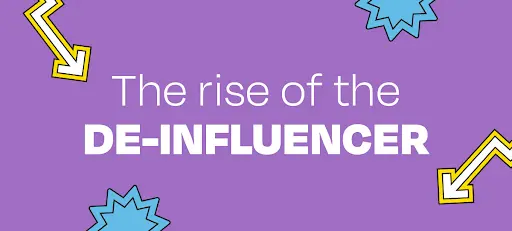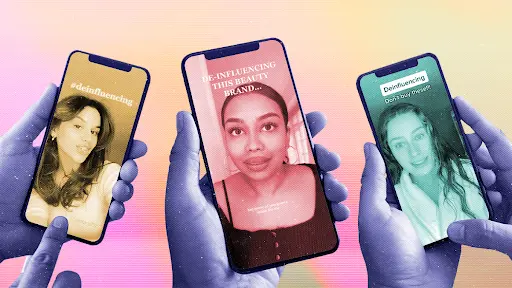The age of social media has brought about a new phenomenon of influencers – individuals with large followings who have the power to sway the opinions and behaviors of their audience. Influencers have been the darlings of the marketing world, with brands throwing money and free productions at them in hope of reaching their massive social media followings. But as consumers become increasingly savvy and discerning, the shine is starting to come off the influencer model. Enter de-influencing, the new trend in marketing that prioritizes authenticity, transparency, and genuine engagement with consumers. However, with this power comes responsibility, and many have argued that influencers often promote negative trends and behaviors. In response, a new trend has emerged – de-influencing. Here are some key points about this growing trend.
What is de-influencing?
De-influencing is the process of intentionally limiting or eliminating the influence that social media personalities, also known as influencers, have on our lives. This includes unfollowing influencers on social media, avoiding their sponsored content, and actively seeking out alternative sources of information and inspiration. The goal of de-influencing is to reduce the impact that these influencers have on our behaviors and attitudes, particularly those that promote unhealthy or unrealistic behaviors. By doing so, we can increase our self-confidence and sense of self-worth, and improve our mental health and well-being.

Image credit to Bustle
Why is de-influencing becoming popular?
Many people are starting to feel overwhelmed by the constant stream of sponsored posts and perfect images that are presented by influencers. There is a growing awareness that this content is often heavily curated and unrealistic, and that it can lead to feelings of inadequacy and self-doubt. De-influencing is seen as a way to reclaim control over our own lives and to reject the pressure to conform to an idealized image of perfection.
Here are several reasons why de-influencing is becoming increasingly popular:
- Mental health concerns: Many people have realized that the constant exposure to carefully curated and often unrealistic representations of other people’s lives on social media can have a negative impact on their mental health. By de-influencing, individuals can create more positive and authentic experiences for themselves.
- Authenticity: With the rise of social media, there has been a shift towards valuing authenticity and transparency in personal relationships and in the brands we choose to support. De-influencing can help individuals prioritize real-world relationships and experiences over the curated content of influencers.
- Skepticism of advertising: People are becoming more aware of the manipulative tactics used by advertisers and influencers to sell products or ideas. By de-influencing, individuals can take control of their own purchasing decisions and be more critical of marketing messages.
- Cultural shifts: As society becomes more aware of the impact of social media on our lives, there is a growing movement towards digital minimalism and intentional use of technology. De-influencing is one aspect of this movement, as individuals seek to reduce the noise and distractions of social media in their daily lives.

Image credit to 10 Yestis
What are the benefits of de-influencing?
De-influencing can have a number of positive effects on our mental health and well-being. By reducing our exposure to images and messages that are designed to make us feel inadequate, we can increase our self-confidence and sense of self-worth. We can also reduce our levels of stress and anxiety by taking a step back from the constant pressure to keep up with the latest trends and fashions.
Take a look at the detail of De-influencing benefits:
- Improved mental health: Social media can contribute to feelings of anxiety, depression, and low self-esteem. De-influencing can help individuals reduce the negative impact that social media influencers can have on their mental health and improve their overall wellbeing.
- More authentic experiences: Social media influencers often portray an idealized and curated version of their lives. By de-influencing, individuals can focus on creating authentic experiences for themselves that align with their values and interests.
- More conscious consumption: Social media influencers often promote consumerism and materialism, leading individuals to make unnecessary purchases. De-influencing can help individuals make more conscious and intentional purchasing decisions, reducing waste and promoting sustainable living.
- Increased productivity: Social media can be a major distraction, leading to procrastination and reduced productivity. De-influencing can help individuals stay focused on their goals and priorities, leading to greater productivity and success.
- More meaningful relationships: Social media can create the illusion of connection, but it can also lead to shallow and superficial relationships. De-influencing can help individuals prioritize real-world relationships and meaningful connections with others
How can you start de-influencing?
There are a number of practical steps that you can take to start de-influencing your life. These include:
- Unfollow influencers on social media platforms, particularly those who promote unhealthy or unrealistic behaviors.
- Seek out alternative sources of inspiration and information, such as blogs, podcasts, and websites that promote a more realistic and balanced view of life.
- Embrace your own unique sense of style and identity, rather than trying to conform to the latest trends or fashions.
- Surround yourself with positive influences, such as supportive friends and family members who value you for who you are.

Image credit to Google
Just to recap
In conclusion, de-influencing is a growing trend that is helping people to reclaim control over their own lives and reject the pressure to conform to an idealized image of perfection. By reducing our exposure to negative influences and seeking out positive sources of inspiration, we can increase our self-confidence and improve our mental health and well-being. If you’re feeling overwhelmed by the constant pressure to keep up with the latest trends and fashions, consider taking steps to de-influence your life today.
————————————————————————————————————–
Article by – Yes Web Design Studio
For more information…
Facebook: yeswebdesignstudio
Instagram: yeswebdesign_bkk
Twitter: yeswebdesignbkk








